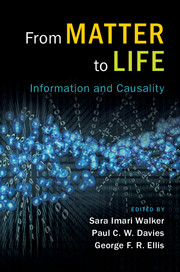Crossref Citations
This Book has been
cited by the following publications. This list is generated based on data provided by Crossref.
Kempes, Christopher P.
Wolpert, David
Cohen, Zachary
and
Pérez-Mercader, Juan
2017.
The thermodynamic efficiency of computations made in cells across the range of life.
Philosophical Transactions of the Royal Society A: Mathematical, Physical and Engineering Sciences,
Vol. 375,
Issue. 2109,
p.
20160343.
Pocheville, Arnaud
2018.
Biological Information as Choice and Construction.
Philosophy of Science,
Vol. 85,
Issue. 5,
p.
1012.
Stopnitzky, Elan
and
Still, Susanne
2019.
Nonequilibrium abundances for the building blocks of life.
Physical Review E,
Vol. 99,
Issue. 5,
Ellis, George F. R.
and
Kopel, Jonathan
2019.
The Dynamical Emergence of Biology From Physics: Branching Causation via Biomolecules.
Frontiers in Physiology,
Vol. 9,
Issue. ,
Smart, John M.
2019.
Evolution, Development and Complexity.
p.
23.
Karasek, Robert
2020.
Handbook of Socioeconomic Determinants of Occupational Health.
p.
573.
Karasek, Robert
2020.
Handbook of Socioeconomic Determinants of Occupational Health.
p.
1.
Staufer, Oskar
De Lora, Jacqueline A
Bailoni, Eleonora
Bazrafshan, Alisina
Benk, Amelie S
Jahnke, Kevin
Manzer, Zachary A
Otrin, Lado
Díez Pérez, Telmo
Sharon, Judee
Steinkühler, Jan
Adamala, Katarzyna P
Jacobson, Bruna
Dogterom, Marileen
Göpfrich, Kerstin
Stefanovic, Darko
Atlas, Susan R
Grunze, Michael
Lakin, Matthew R
Shreve, Andrew P
Spatz, Joachim P
and
López, Gabriel P
2021.
Building a community to engineer synthetic cells and organelles from the bottom-up.
eLife,
Vol. 10,
Issue. ,
Bourrat, Pierrick
2021.
Facts, Conventions, and the Levels of Selection.
Gentili, Pier Luigi
2021.
Why is Complexity Science valuable for reaching the goals of the UN 2030 Agenda?.
Rendiconti Lincei. Scienze Fisiche e Naturali,
Vol. 32,
Issue. 1,
p.
117.
Ramrattan, Lall
and
Szenberg, Michael
2022.
The Purpose of Life in Economics.
p.
65.
Dodig-Crnkovic, Gordana
2022.
Philosophy and Theory of Artificial Intelligence 2021.
Vol. 63,
Issue. ,
p.
3.
Kitchener, Peter D.
and
Hales, Colin G.
2022.
What Neuroscientists Think, and Don’t Think, About Consciousness.
Frontiers in Human Neuroscience,
Vol. 16,
Issue. ,
Rosenthal, Adam R.
2023.
Artificial Life, Feeling Machines, and the Text of Deconstruction.
Derrida Today,
Vol. 16,
Issue. 2,
p.
129.
Strikwerda, Johannes
2023.
Organized Complexity in Business.
p.
97.
Senatore, Federica
Villani, Marco
and
Serra, Roberto
2023.
Artificial Life and Evolutionary Computation.
Vol. 1780,
Issue. ,
p.
130.
Poulsen, Victor Møller
and
DeDeo, Simon
2023.
Inferring Cultural Landscapes with the Inverse Ising Model.
Entropy,
Vol. 25,
Issue. 2,
p.
264.
Senatore, Federica
Serra, Roberto
and
Villani, Marco
2023.
Artificial Life and Evolutionary Computation.
Vol. 1780,
Issue. ,
p.
119.
Gentili, Pier Luigi
2024.
The Conformational Contribution to Molecular Complexity and Its Implications for Information Processing in Living Beings and Chemical Artificial Intelligence.
Biomimetics,
Vol. 9,
Issue. 2,
p.
121.





